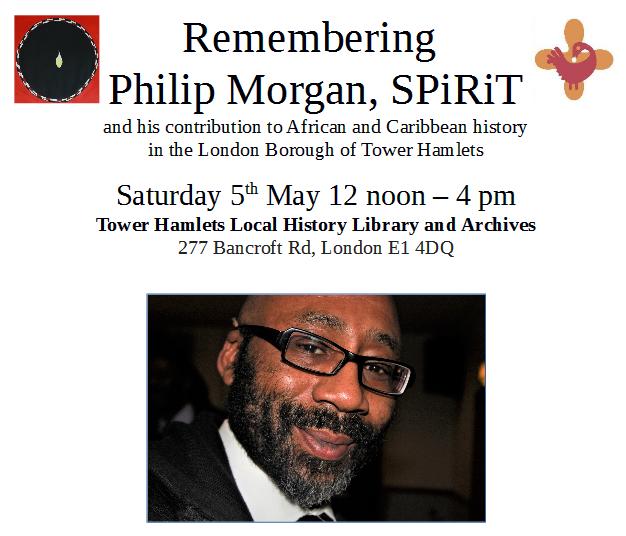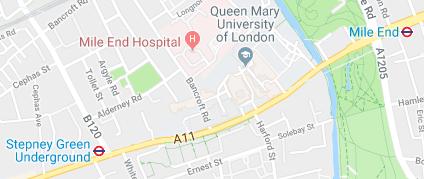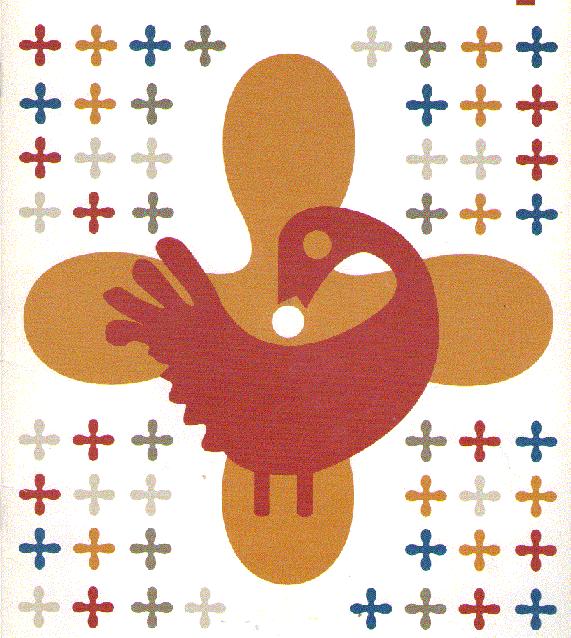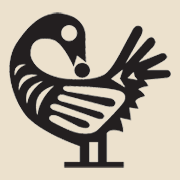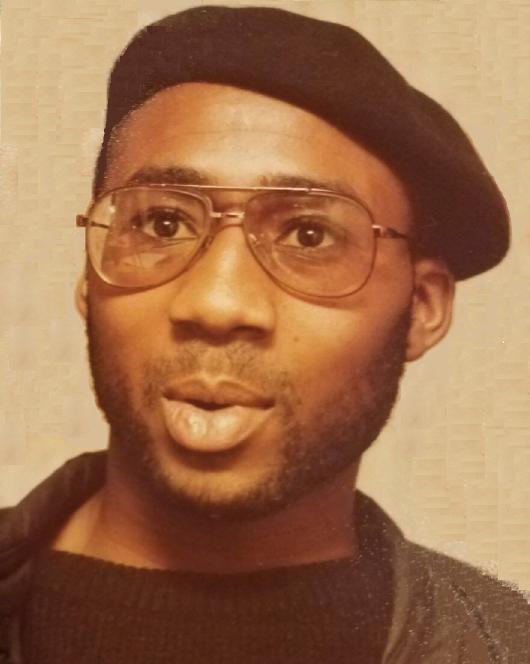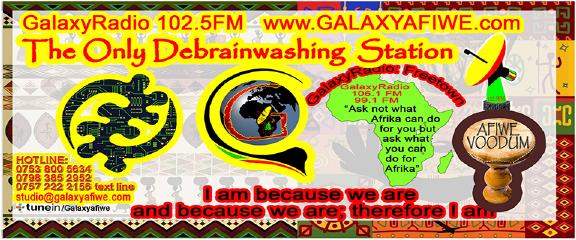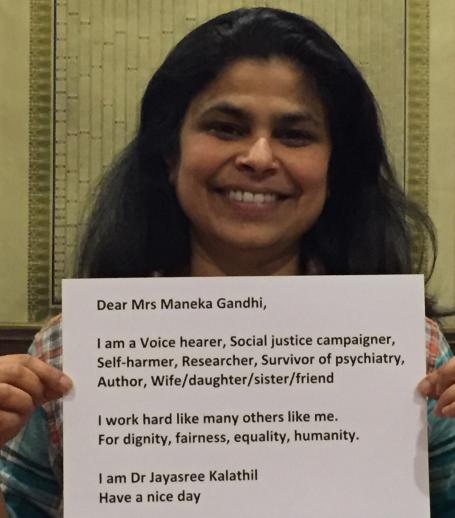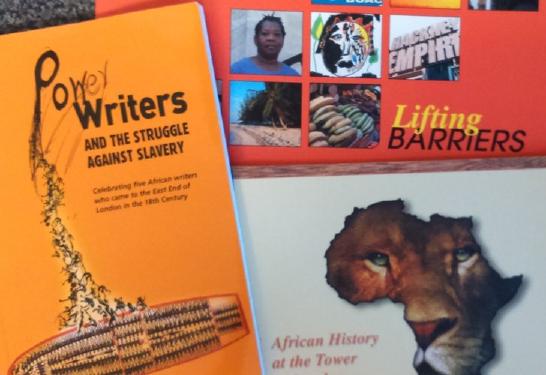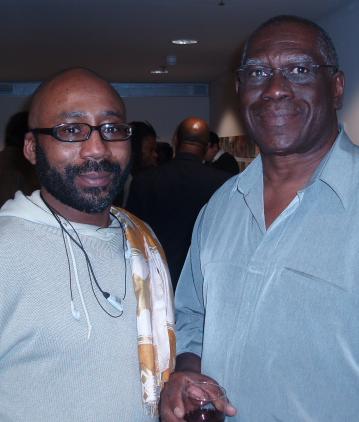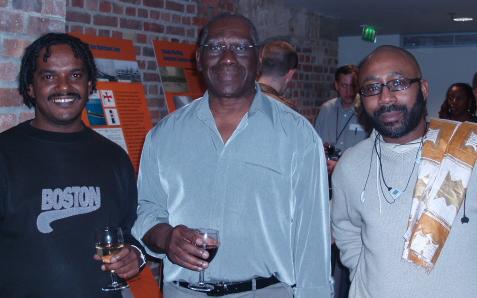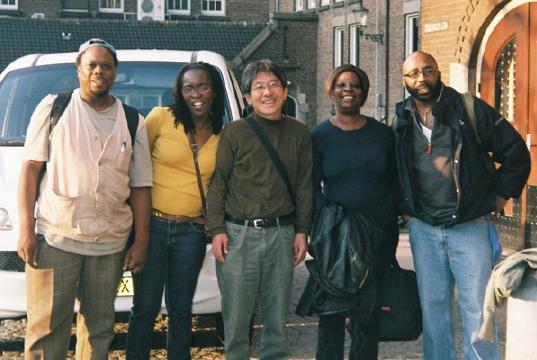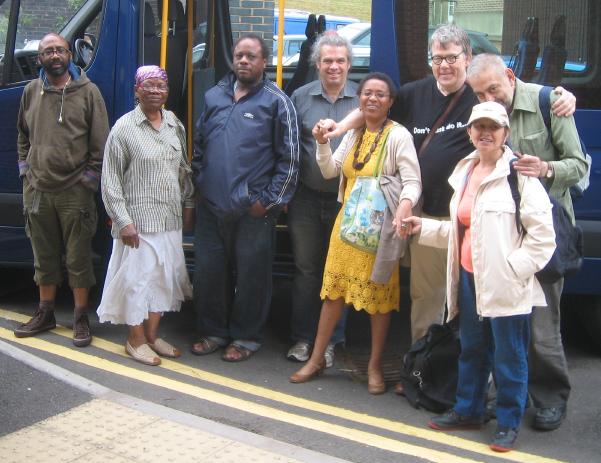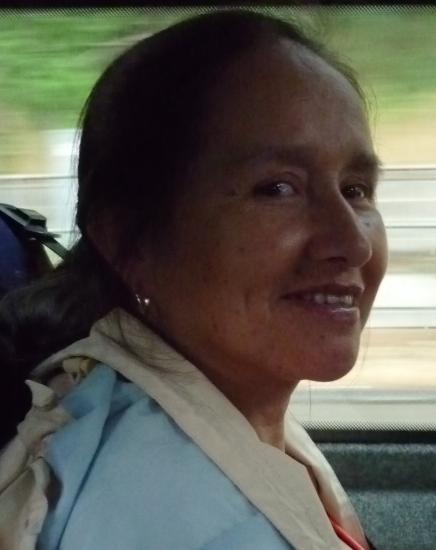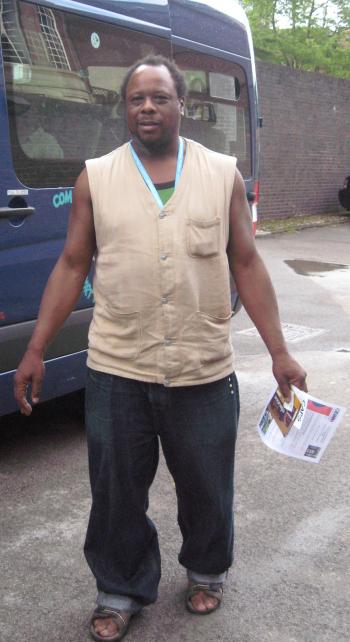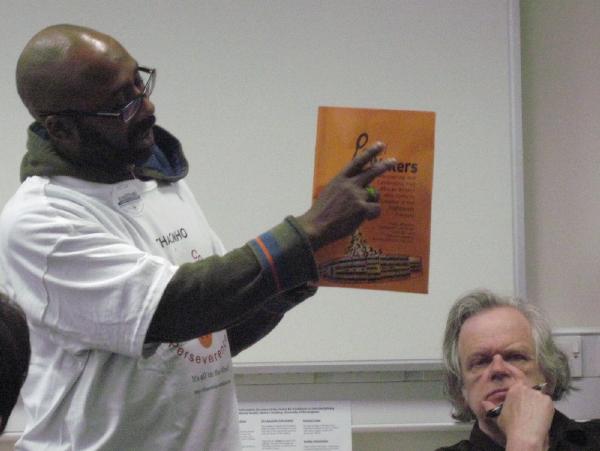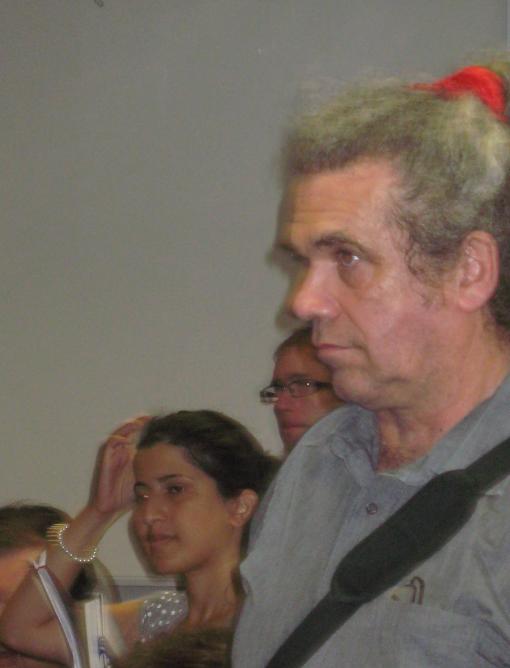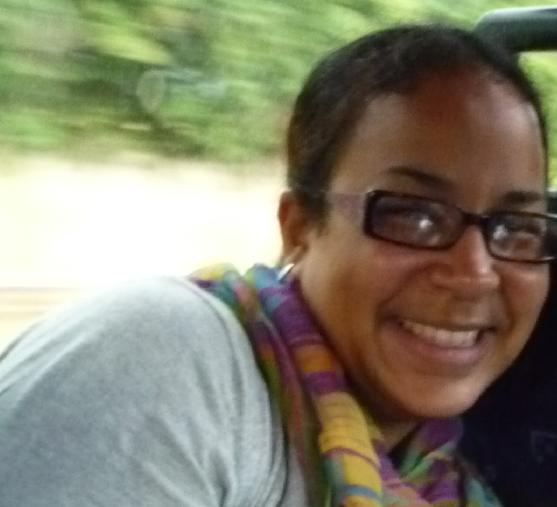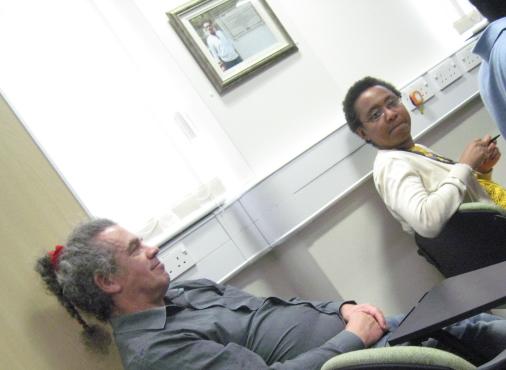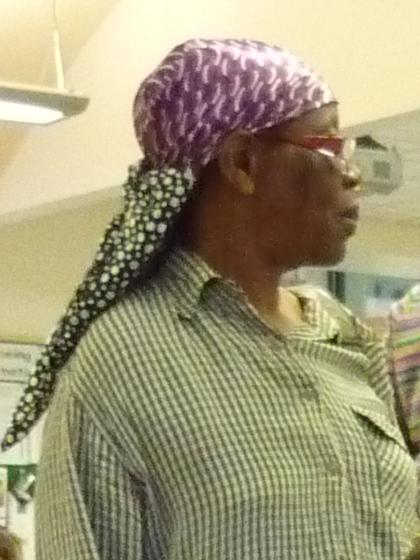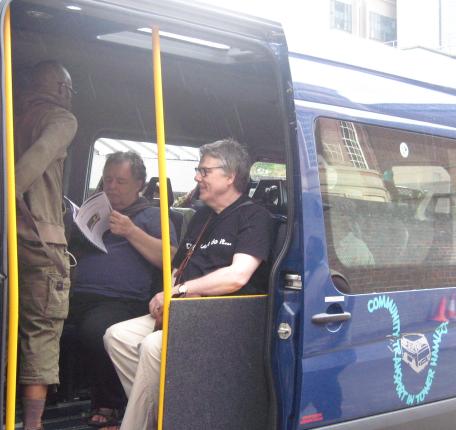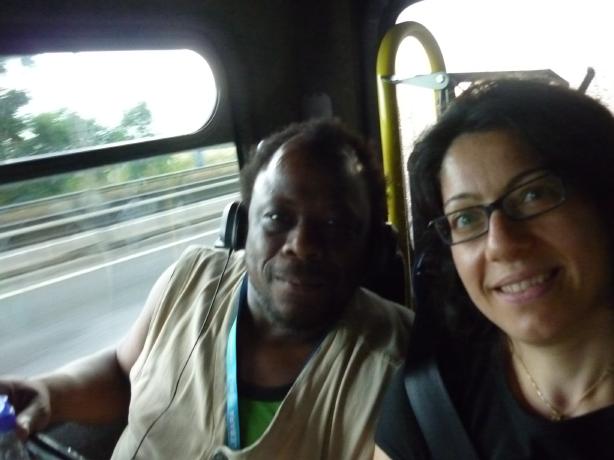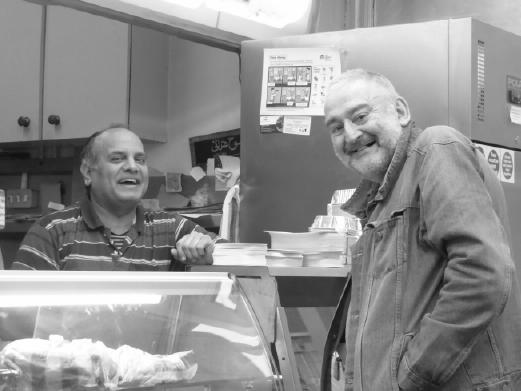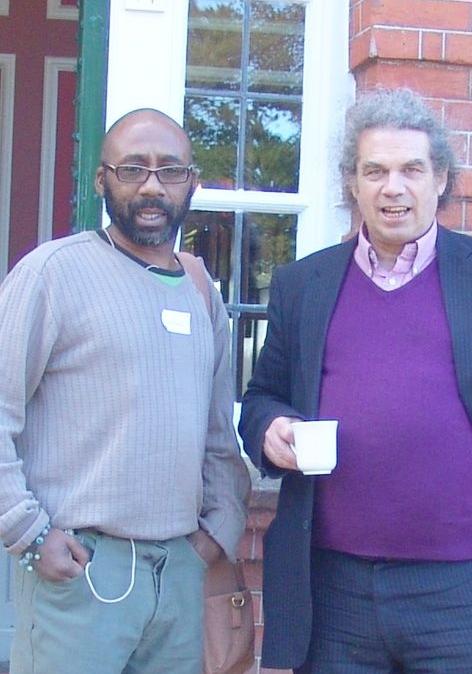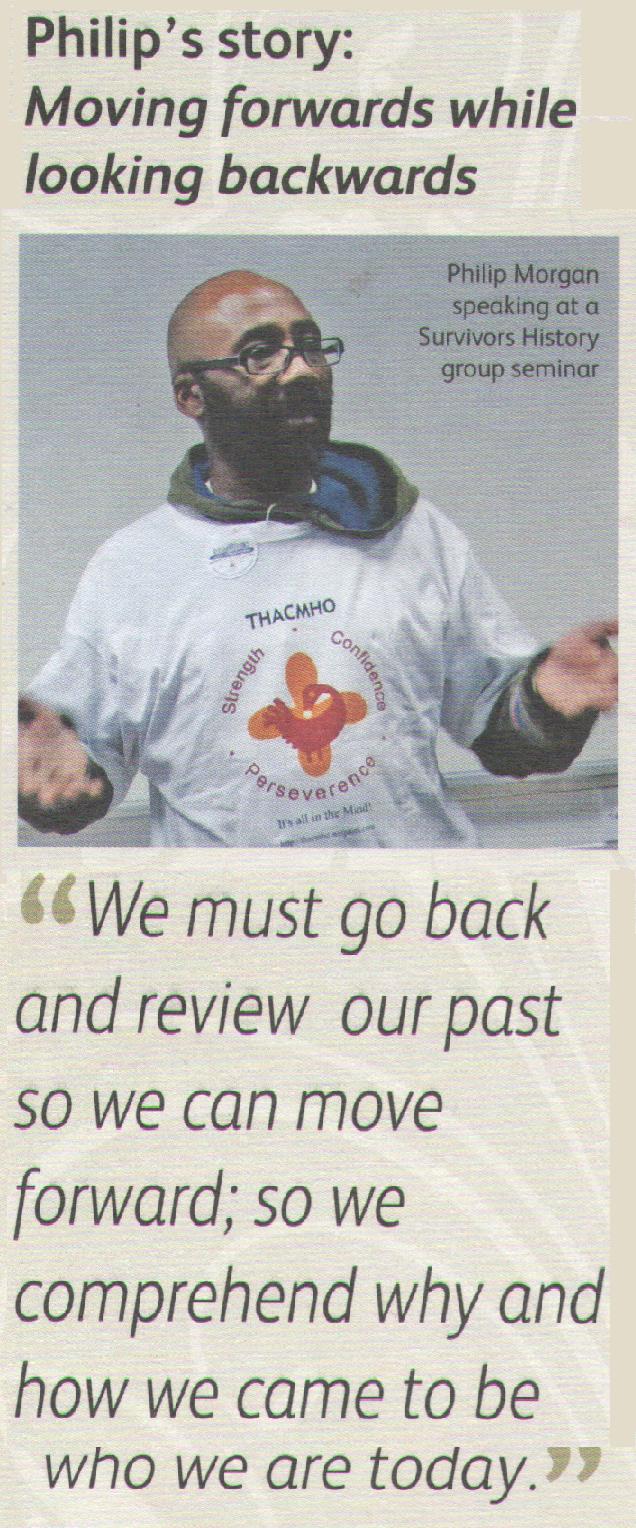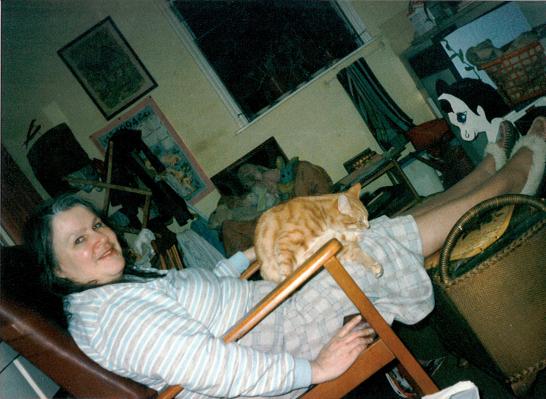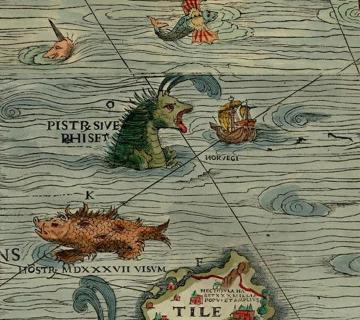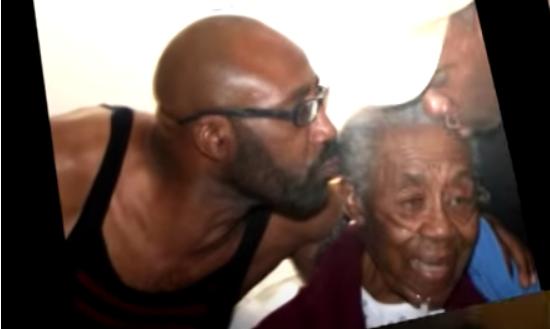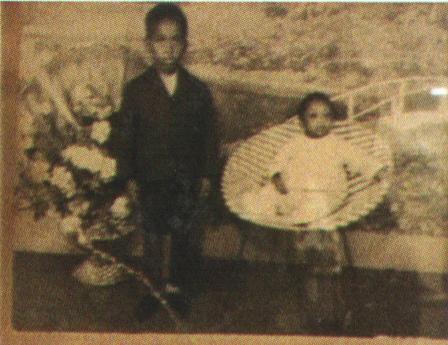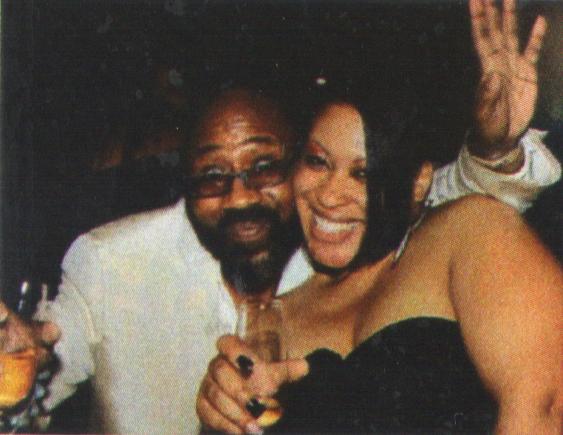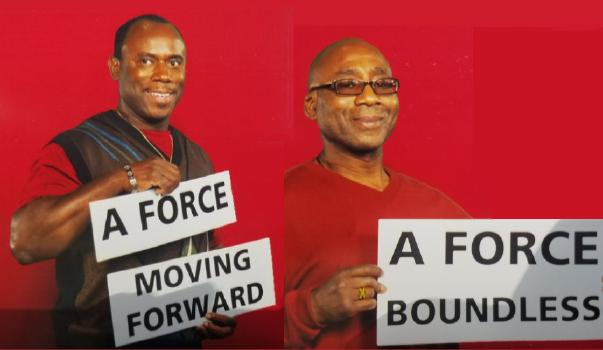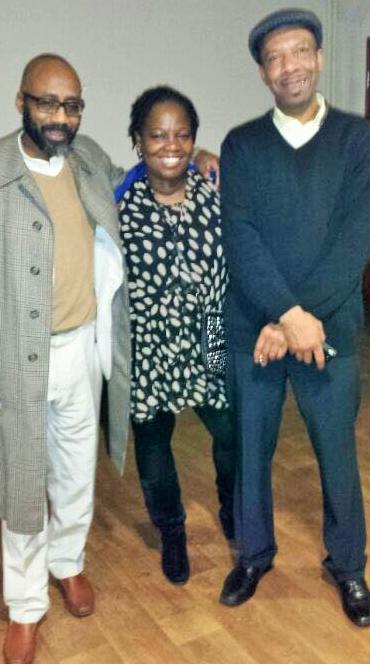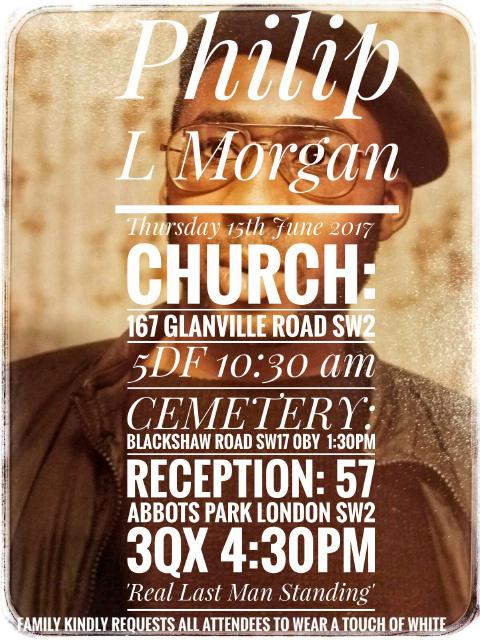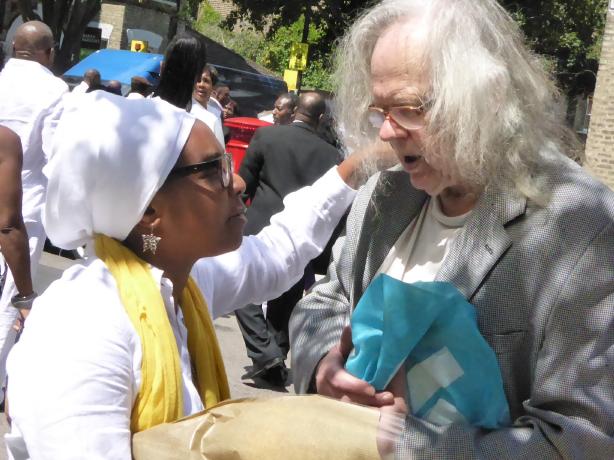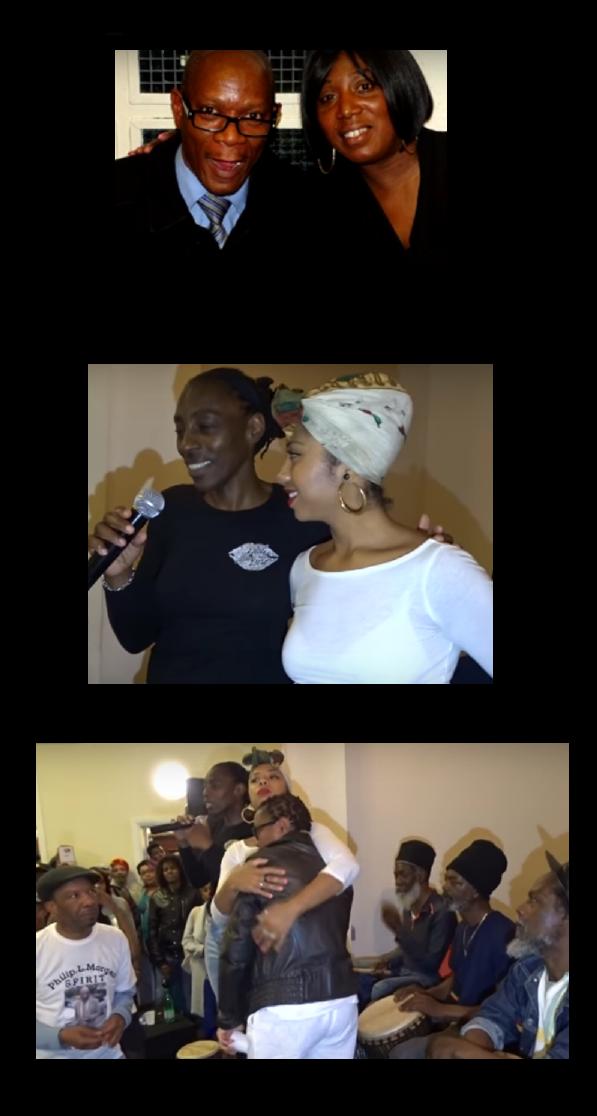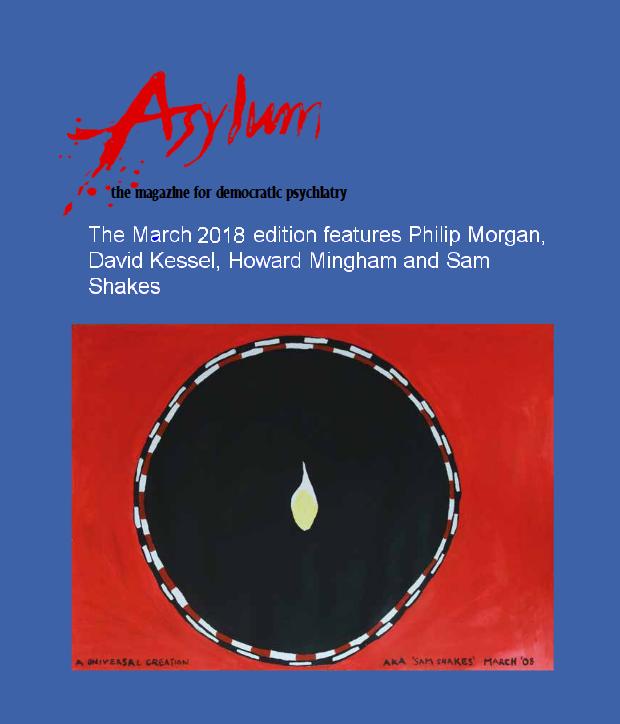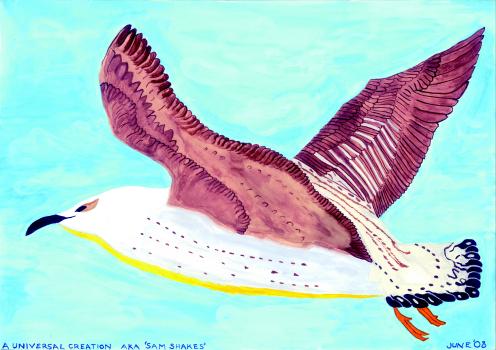An event open to all, organised by some of Philip Morgan's friends and
supported by his family and the Tower Hamlets Local History Library and
Archives. Come and join us in remembering a brother, friend, mentor and
community activist.
Learn of his work with
mental health survivor groups and in particular the
Health Through History Initiative which was designed to heal
African and
Caribbean people experiencing mental health challenges in the borough of
Tower Hamlets
Philip Lee Morgan
was born in the London Borough of Lambeth on 13.1.1965.
After an insecure childhood in foster homes and institutions he became
homeless. With counselling and social work help he was rehoused and became
a pioneer of "health through history", which explores recovering yourself
through knowing who you are and who you relate to.
Philip's life is explored in the
photographs and
memorials
on this page.
Philip died on 6.5.2017 and
at his funeral in south London his friends and relatives resolved that his
spirit would live on in celebration of his life and ideals, of relating to
one another as one family, and of finding health in who we are. Philip was
known, and liked to be known as SPiRiT, the poetic import of this name
becomes clearer as we explore his own work and that of those who knew him
Here we are honouring five African writers who we call our Power Writers.
They are amongst the founders of Black literature in the English-speaking
world.
Phillis
Wheatley (1753-1784),
Ukawsaw Gronniosaw (1710-1772),
John
Marrant (1755-1791),
Olaudah
Equiano (1745-1797),
Quobna
Ottobah Cugoano (1757-1801)
All lived in London during the
last quarter of the eighteenth
century. This was a period of great social change: the
French
Revolution (1787-1799), the American War of Independence
(1775
-
1783)
and in England
there was an Abolition Movement supporting the struggle of enslaved
Africans fighting for their freedom.
During this period there was a Black presence throughout the British Isles,
including Liverpool, Bristol and London. It was estimated that the Black
London population was between 10,000-20,000, mainly men made up of domestic
servants, sailors and Black Loyalists (Africans who were guaranteed their
freedom as British soldiers during the American Revolution). In London
there were Black settlements in Marylebone, Covent Garden and the East End
specifically Mile End and Ratcliffe.
It was here in London that the first breakthrough in the abolition of
slavery came in 1772. This was known as the Somerset Case. The judge, Lord
Mansfield. declared that a Boston slave-owner could not force James
Somerset, an African, on board a ship bound for the West Indies. The
Africans who crowded in the court gallery immediately celebrated. The judge
estimated there were 14,000 slaves in England. After his verdict they could
not be recaptured if they took their freedom. This news spread like
wildfire throughout the British Empire.
Our Power Writers came to London's East End for different reasons:
Phillis Wheatley to get her book published, Ukawsaw Gronniosaw and John
Marrant to find friends and join a religious community, and Equiano and
Cugoano were active abolitionists who were involved with the Sierra Leone
settlement. These writers give an important account of the issues facing
African people at this time,
Following the success of the first edition, our booklet has been circulated
nationally and internationally, It has been mentioned in the Houses of
Parliament and taken up by some Tower Hamlets' schools - where children did
the walk themselves during Black History Month 2004. The success and
popularity of the walk has been officially recognised by Tower Hamlets
Council who wish to incorporate it within their cultural walks programme.
Furthermore libraries. community groups and a variety of other
organisations in the UK and overseas have placed orders for our first
edition.
All this shows how bringing this information to light gives us a means to
rediscover areas of our history which have been hidden for far too long,
Out of this comes a powerful tool which facilitates personal and community
development through awareness of history, This is an important part of the
healing process from the trauma of our past. THACMHO has identified that a
strong vibrant and caring community is the best form of treatment that we
can get. This publication is aimed at restoring lessons from our history so
that our community can face the future with greater confidence, supporting
individual self-esteem and enjoying a clearer understanding of the issues
which face us today,
London's Black African History and Today (2004) by Philip Morgan
London's black history is one littered with tales of displacement and
tragic misadventure. The evil horrors of the past have clearly left what
may appear to be an indelible mark on the people and infrastructure of
Britain today. Even though slavery has long been abolished, many of the
prejudices of yesterday still remain intact in an advanced form of what is
now called "institutional racism".
The success of Britain as a world power has to be mainly credited to
colonialism and slavery, African peoples have made immeasurable
contributions to the social and economic infrastructure of Britain for
literally thousands of years through language, culture, science and
religion to name but a few. The enslavement of Africans undeniably
benefited capitalist development in Europe and the Americas far more than
many are willing to admit. Millions of Africans were enslaved from the
sixteenth century right up to the middle of the twentieth century, The vast
majority lived and worked in terribly appalling conditions and had to put
up with the most extreme forms of oppression as a centrally essential part
of their everyday existence.
In spite of these dark and gruesome facts concerning Black History, it is
evident that the spirit and resilience of African peoples remained strong.
When they had the chance they diverted and amused themselves with various
forms of companionship and entertainment. A few took pen to paper and
recorded their experiences so that people of the future might begin to
understand the appallingly flagrant depth of atrocities that existed then.
Even so, it is worth noting that virtually all records of slavery written
by slavers and the like reflected the evils practised therein.
There are several distinct differences between Black writers of the past
and those of the present. Without doubt writers of the past were concerned
with their bondage and their more recent cultural ancestry, Whereas, many
writers of the present are more concerned with other social issues relevant
to their modernity, such as; crime, music, sex and violence. Other than
that, perhaps the main issues of economic, racial and social oppression can
ally themselves to the bedrock of the institutional racism which has
remained consistent from the past to the present. This effectively means
that despite the vast range of differences and the virtual vacuum between
the writers of the past and present, there are interesting similarities
linking them together: those being the influence of their life experiences
in relation to race, its diasporas and the sub-cultures that have developed
as a result.
Changes in White British attitudes towards Black people have been far more
forced than voluntary which may have further institutionalised racism to a
greater extent than it previously had been - this most especially when we
consider the fact that the foundations of the British economy were centred
on colonialism and slavery. Adding to this, Abolition served a crucial
economic purpose. A lot of money was saved through the non provision of
clothing, food, shelter and other everyday social benefits etc. Knowing
this, slavers (or ex-slavers) and their associates were able to make even
more vast amounts of money through rent, taxes, welfare and the supply of
provisions. Furthermore, monies paid by the British government as
compensation for Abolition was retained by the slavers with little if any
being redistributed to the slaves themselves. Capitalism was further
safeguarded by government censuses and official 'race categorisations'.
None of which existed before the 'Black' or 'Negro' came to their so-called
knowledge. This knowledge, rationalised through a subjective understanding
of science and reason justified and formalised many of the divisions that
have arisen within our world society over the past five hundred years. The
engagement of Black professionals within government and business
institutions has failed to stem the practice of social indifference and
rough justice. Sadly many of us (or them) are seen to be integrated into a
system that is inherently corrupt.
The world at present is wrought with a multitude of internal conflicts
where earth culture and human identity seem to play little or no real part.
Our everyday concept of knowledge is based on material factors and life is
merely used to reinforce that false sense of reality. The rise of
globalisation has brought about the destruction of numerous natural
indigenous cultures and introduced new ones based on material ethics.
It becomes clear that real self-consciousness can only be achieved through
a better understanding of human and environmental realities. This simple
yet honest approach to the way we perceive the world and each other will
lead to an infinitely more accurate understanding of knowledge and life
that can assist in the selective re-introduction of natural cultures and
values more reflective of the human condition. This focus on a more natural
human development in all elements of society will lead to self-realisation
giving people a truer sense of identity and a greater purpose for living
their lives .
These are the main issues worth considering in relation to the past,
present and future of African peoples and their descendants:
I. Redemption may well be past its sell-by date as the wages of sin have
well and truly been paid in full.
2. Reparations could not possibly begin to atone for one life let alone the
countless millions that suffered and died for wretched worldly gains.
3. Repatriation can hardly be appealing for many descendants of Africa
whose
original native homeland continues to be gang-raped of its resources and
kept with no soul.
Sadly there are many other issues needing to be addressed. An inheritance
of the material and metaphysical follies of the world should not be an
option in any way. The three points raised need not be so pessimistically
cynical, however. The truth will always out and is always stranger than
fiction.
PHILIP MORGAN was born in London in 1965 and has demonstrated his
interests and concerns for the socially disadvantaged by working with
several organisations and charities as a volunteer, Having pledged a
lifelong commitment to genuine good causes, he is a positive advocate of
good all round health focusing on physical, personal and spiritual health
aspects in particular, His work with THACMHO has gone from strength to
strength as the Power Writers book, in part, will testify.
Young Philip Morgan
For many years, Philip Morgan was a community radio disc jockey working
for
Galaxy FM in Peckham.
Galaxy FM, also known as GalaxyAfiwa says its mission is "to de-brainwash
the
black community".
It combines soca and
reggae music with black empowerment.
Galaxy uses the Southern African proverb "I am because we are and
because we are I am" which relates the individual to his or her
associations and culture.
"A Fi We Country" is the title of a reggae song commissioned in 1975 by the
Jamaican Tourist Board from singer Max Romeo. It includes the lines "I know
we've travelled far from those slave markets in Zanzibar, this land is our
own sweat and blood, so let's live up, not shoot it up." The song title
transliterated from patois means "For Our Country,"
Afiwe is a Yoruba (western Nigeria) verb for liken, as when we liken
something to something else. It has been related to the way some west
African languages are built like networks of comparisons, and also to the
use of visual images with analogical (afiwya) force to engage the viewer in
an idea. The
Galaxy FM logo is an
example of this. A Yoruba proverb says "If it is not present to the eyes,
it does not weigh on the mind".
Jayasree Kalathil moved to the United Kingdom from India about 2003.
This picture,
part of a campaign, was taken in January 2016.
This is Jayasree's tribute to Philip Morgan:
Philip Morgan, one of our beloved brothers in the black and minority
ethnic mental health user/survivor movement, has passed away. Philip
had been with the Tower Hamlets African Caribbean Mental Health
Organisation (THACMO) for
over 15 years as a volunteer coordinator.
He also worked extensively with
Social
Action for Health,
Mellow,
Catch-a-fiya and other networks as trainer, campaigner, mentor,
community worker. Philip was larger than life, with a great sense of
humour and a veritable performer in public forums. My most abiding
memory of him is at the launch of Catch-a-fiya [on 19.1.2007], where his
MC-ing
style brought a joy to the occasion while never side-lining the
political and historical significance of a bunch of mad and
minoritised people launching their network in the heart of London, in
the Mayor's office.
As a writer, Philip contributed to several books, including 'Power
Writers and the Struggle against Slavery', 'Lifting Barriers: African
and Caribbean People Tell Stories of Struggle, Strength and Achieving
Mental Health' and 'African History at the Tower of London'.
Philip
was a historian of our cultures and struggles, especially of the
Black history of East London.
I guess most people who knew him would
have heard him explain eloquently the concept of 'Sankofa' - one
imagination of which is of a bird with its feet forward while head
turned back, symbolising how the critical examination and
investigation of the past serves as a guide to the future.
He wrote
in 'Power Writers': "...real self-consciousness can only be achieved
through a better understanding of human and environmental realities.
This simple yet honest approach to the way we perceive the world and
each other will lead to an infinitely more accurate understanding of
knowledge and life that can assist in the selective re-introduction
of natural cultures and values more reflective of the human
condition."
Philip was one of the people who welcomed me into the movement when I
moved here 14 years ago. I have not had many occasions to meet with
him in the last couple of years. I will miss the warm hugs and the
half-joking, half-serious question regarding my on-again-off-again
attempt to write the history of the black survivor movement: "Have
you finished it yet? Where is my copy?" I guess I better get on with
it.
Philip 'Spirit' Morgan, 1965-2017. Rest in peace, my brother. Jayasree
Kalathil
Roy Hayde is a member of THACMHO. Breakdown is one of the poems he
performed at the Reminiscence Conference of West Indian Seamen on 28.2.2004
which reflected his experiences shortly after becoming unwell.
BREAKDOWN
Weekends come and weekends go.
Philip Morgan and
Harry Cumberbatch 9.11.2006 at a reception held for
THACMHO by the Tower of London Education department and (next)
Sidney Millin
with them at the same event
Daniel, Joanne, Yoshi, Maude and Philip Morgan at the Maastricht rail
station in the Netherlands, where they attended the First World Hearing
Voices Congress on 17.9.2009 and 18.9.2009
Philip Morgan performs Ukawsaw Gronniosaw in
"A Pageant of Survivor
History: Mental patients in poetry, story and song from the 18th
to 21st
century" at Kingsley Hall on Friday 19.3.2010
Philip Morgan,
....,, ,
Daniel Johnson,
Fabian Tompsett,
Sam
Shakes,
Ian
Ray Todd,
David Kessel and
Nelsy with the bus that took them to Birmingham
University on Wednesday 14.7.2010 to talk about Health through history.
Amongst the others who went on this historic journey were
Joe Kelly,
Nathalie Fonnesu
and
Dina Ibrahim.
"my name is Nelsy. I was born in Colombia"
Daniel Johnson
Philip Morgan used visual images with analogical (afiwya) force to engage
the viewer in an idea
Dina Ibrahim was born under the African sun and she is buried
in the Sudan, under the orange sun over the river Nile, which she loved
Sam Shakes and Fabian Tompsett provide a different angle on survivors
history at the Birmingham seminar
Philip Morgan chats to
Ian Ray Todd and
Joe Kelly studies his papers from the
Birmingham seminar aboard
the Tower Hamlets Community Transport bus.
Daniel Johnson and
Nathalie Fonnesu
on the bus going home from Birmingham to Tower Hamlets.
Daniel is a
stalwart of
Tower Hamlets African and Caribbean Mental Health Organisation
(THACMHO) and Nathalie is a founder member of
F.E.E.L. - Friends of East End Loonies
. Both are members of the
Survivors History Group
David Kessel has been buying curry from Mr Mo in the Shalamar Kebab
House in Whitechapel for the past 25 years. David is another of the
founders of
F.E.E.L. - the Friends of East End Loonies
, which meets in nearby Fieldgate Street.
F.E.E.L. (Friends of The East End Loonies)
I'm a Friend of the East End Loonies
I'm a Friend of the East End Loonies
I'm a Friend of the East End Loonies
I'm a Friend of the East End Loonies
At the Friends of the East End Loonies
HEALTH THROUGH HISTORY - A REPORT OF THE BIRMINGHAM SEMINAR LED BY PHILIP
MORGAN Wednesday 14.7.2010
The seminar discussed the relevance of health through history to
the African diaspora and to the mental health survivors movement. Philip
spoke on Tower Hamlets Afro-Caribbean Mental Health Organisation (THACMHO)
199* and others spoke on Survivors Speak Out 1986-2000 and Self Harm
Activism 1986-2004.
Philip Morgan:
- Sankofa Bird - can look behind - a symbol. You have to look behind before
you can move forward.
The Sankofa bird is flying forward while looking backward with an egg in
its mouth. The egg symbolizes the future. "We must go back and reclaim our
past so we can move forward; so we understand why and how we came to be who
we are today."
Highly relevant to African diaspora - their history is not just about
slavery.
THACMHO going for 14 years - issues: medication: Afro Caribbean people get
higher doses, longer courses and less or no access to talking therapies -
this especially a problem in the past.
Health Through History project - book celebrating 5 African writers who
came to London (Tower Hamlets) in the 18th century - e.g Phillis Wheatley
(US house slave wrote a book of poems and given permission to go to London
to get it published). The project started in response to local council
publication that on 1000 years of history that didn't mention African /
Caribbean people before 1960s
THACMO has produced a number of other publications. One of these concerns
West Indian seaman. Philip's own father was a seaman. Another is about
Africans and the Tower of London.
The organisation runs on £24,000 a year.
Discussion
Louise Pembroke said that society's attitudes are reflected in psychiatry.
Ian Ray Todd said that psychiatry is a euro-centred science
Philip said that he thought it was more than just a matter of culture. The
term he uses is "mindful ignorance". White people carry a great deal of
guilt for what white society has done to black people in the past.
Andrew Roberts - talking about Survivors Speak Out (SSO) - 'a 'network' not
a 'campaign' - begun by Peter Campbell
1985 - a new idea - 'survivors' - the term has struck a chord
1989 -Self Harm - Perspectives from Personal Experience by Louise Pembroke
- personal accounts, not easy reading. Louise now hoping to get it made
available to download free. Book demonstrates people's difficulty in
getting support / being listened to.
Andrew's questions - What is the significance of the network's title?
What is the importance of survivors getting together?
What keeps things going? - NB Peter Campbell kept a newsletter going for
years and it helped keep people linked up
What is the significance of doing it ourselves / speaking out?...
Discussion
Discussion of terms -
David Kessel spoke about the arguments about the name "Survivors Speak Out"
at Minstead Lodge. He and others wanted the organisation to be a "union"
that representative of mental patients and organising us collectively in a
struggle for our rights.
Andrew made point that 'mental patient' term was a political statement in
the 1970s. Professionals would want to call them psychiatric patients. It
was like the 'mad pride' label - taking the pejorative term to yourselves.
Louise Pembroke agrees not everyone likes the term 'survivor' and believes
its about what people themselves are comfortable with and that linguistic
'fascists' - should not dictate what is appropriate.
Someone asked about the relation between Survivors Speak Out and critical
psychiatry (on the one side) and movements in the black community on the
other.
Louise Pembroke said that Survivors Speak Out really struggled to build
bridges between black and white survivors and she wished they had achieved
more.
Philip spoke about the positions of black and white survivors often being
different. Black survivors are over-represented amongst those in poverty
and poor conditions and the struggle with everyday living often leaves no
time or energy for movement activities.
Andrew commented that the involvement in practical, material issues, may
have been the reason that Mental Patients Unions appeared to have been more
multi-cultural than Survivors Speak Out. Unlike Survivors Speak Out, MPUs
were as much inside hospitals as outside. The first chair of Hackney
Hospital Mental Patients Union was white, the second chair was afro
caribbean. The involvement in housing and similar practical issues may also
have made a difference.
Someone spoke about the ambiguity of terms. Should she define herself as
able or disabled?
Someone else spoke of the importance of defining ourselves and not adopting
other people's definitions.
There was a detailed discussion of self-harm and the work of
self-harm activists to humanise approaches to self harm.
Mark Cresswell said that the two roots of activism were the feminist and
survivor movement.
Why is it necessary? - 1979 research: Accident and Emergency staff despise
and punish self-harmers - and this still happens - e.g. suturing without
anaesthetic (trying to discourage repeat admissions? - no attempt to
understand what drives the person's actions)
Philip Morgan says the system needs to be changed from the foundation not
the roof.
Louise Pembroke says people are chipping away at the mountain but it will
take a very long time. She advices new recruits to plan for their children
and grandchildren. Do not expect change in your lifetime, but lay the
foundations for change in the next.
Someone said "We are all people at the end of the day" - And it was the end
of the day.
Philip Morgan and Fabian Tompsett at the
Windsor conference of the Consortium for Therapeutic Communities
in November 2010
Sometimes the way we are treated makes us feel bad about ourselves. This
was the message of books by Erving Goffman with titles like Asylums (1961)
and Stigma (1963). These showed how the positive images that people have
about themselves can be turned into negative ones.
Can we turn these negative images into positive ones? Some of us come to
terms with our history by writing it down, including the pain of breakdowns
and failures. Sometimes these accounts can be discussed with others in a
safe environment and sharing our experiences may enable us to help one
another.
Sadie Gower and Philip Morgan are members of the Survivors History Group.
As far back as the group has traced, people who suffer mental distress have
individually and collectively worked with negative images and shared
experiences with others in ways that are positive.
In this article, Sadie and Philip explore the benefits and dangers of such
emotional journeys.
Philip seeks health through history
When Philip spoke at a Survivors History Group seminar at Birmingham
University in July 2010 he displayed the theme of his talk on his T-shirt
The Sankofa bird turns to recover the past in order to fly forward. One of
her meanings is that we should be willing to learn from our mistakes.
In the Akan language of Ghana, "sanko" means "go back" and "fa" means take.
The Sankofa bird flies forward while looking backward with an egg in its
mouth. Philip explained that the egg symbolizes the future.
"We must go back and reclaim our past so we can move forward; so we
understand why and how we came to be who we are today."
Philip works and studies history in Tower Hamlets African and Caribbean
Mental Health Organisation (THACMHO). Its projects include "The Health
Through History Initiative".
Its two symbols are Tabono representing strength, confidence and
perseverance, and the Sankofa bird. Tabono (the paddles) suggests paddling
a canoe upstream. It symbolises strength and endurance in our emotional
journeys.
In 1996, THACMHO was started as a place to talk by psychiatric patients of
African descent who found that they got more medication, but less talking
therapy, than other people being processed by the system. Early
conversations focused on the low self-esteem communicated by the idea that
their history was the history of slavery. The group set about researching
what their history actually was.
For "Black History Month" in 2001 they organised a history walk through
Tower Hamlets, visiting sites associated with five African writers from the
end of the 18th century. These included Phillis Wheatley, a house slave
from the United States who wrote a book of poems and was given permission
to go to London to get it published. After further research, they wrote
and published Power Writers and the Struggle Against Slavery - Celebrating
five African writers who came to the East End of London in the 18th century
(2005).
In 2004 THACMHO organised a reminiscence conference on the history of West
Indian Seamen who sailed regularly during the 1950s and 1960s on the
Harrison Shipping Lines to the West India Docks. This too led to the
publication of a book. They have also researched and published a book about
Africa and the Tower of London.
In the Celebration of Survivor History (Time Together Summer 2010, pages
24-25) Philip played the part of Ukawsaw Gronniosaw, an African prince
considered foolish or insane, who came to London and married an East End
silk-weaver.
Sadie finds mixed emotions in history
Sadie has always wanted to know about her family's history. Recently she
learnt to use the internet and began to explore online records. She tells
us how this led to mixed emotions in her family. Family history is popular
nowadays and Sadie found a survey (Anne-Marie Kramer Sociology volume 45,
number 3, June 2011, pages 379-395) that shows how we relate family history
to ourself, to feelings of belonging, and to who we think we are. Sometimes
we hate it, sometimes we love it. Sadie's story shows how history can get
very emotional.
I looked up my paternal grandmother's family because of a family myth that
we are distant cousins of people who, amongst other things, helped to found
the People's Dispensary for Sick Animals after the first world war. My
sister and I remembered mother talking about them, and my sister saw a
programme on television about them. I have a newspaper cutting which my
mother cut out when the lady died in 1947, preserved carefully in tissue,
and handed on to me.
I traced the lady's history, and that of her father, and after making
notes, I looked further back, and found the generation before the father. I
then had problems because I started to think!
This family must have been quite wealthy and important in their day. The
grandfather was a lawyer and scribe in his town, and he, his wife and the
children they lost as babies, were all buried in a huge stone vault in the
parish church. By contrast, my great-grandmother could not write her name
and marked official documents with a cross. I doubted if any of my close
family ancestors, living at the same time as these rich people, were much
more literate. Surely a lawyer would have read and written fluently, and
have access to money, to study law and make a living writing documents for
the people who could not write themselves.
Both families, poor and rich, lived in Kent, but in different parts. As
their circumstances were so different, I began to doubt that they were
related. As I thought about where the idea that we were related might have
come from, I invented a new family myth: My mother and father played
together as children, and started going out together as young teenagers.
My mother told me how much they enjoyed "the pictures" (cinema films),
which were the excitement of the 1920s. I imagined them seeing those old
Pathe newsreels, and seeing people on them with a similar family name. I
then imagined them arriving home for tea, and saying to Dad's mother "Are
you any relationship to.......?" Grandma, I thought, might have found it
amusing that the lifestyle they were so taken with could be in any way
related to her family, and said with a wry smile. "Oh of course, they are
my distant cousins"
There the idea stuck; the teenagers grew up, got married and had children,
and faithfully told us that we were distantly related to these important
people. Well, they had been through World War II in the interim.
When I excitedly told my sister what I had discovered, she seemed rather
upset by what I said. I think this was because we both have close
connections to our pets, and she liked to believe that had been passed down
through the generations. Losing this family story was a real loss for her.
My family history research fascinates me, and gives me a sense of identity.
but I will be more sensitive to other family members feelings about the
material in future. They may have different feelings about the family
story, and be attached to it in different ways. I could be treading on
someone's dreams, even part of their sense of identity.
The Happy Man who Refused Love and Help by Sam Shakes is a fairy
tale for all ages that tells how the benevolent Leon cannot accept Teresa's
love and murders her. Are you capable of murder? it asks. Time to listen to
what is going on in your head?
Sam wrote the story in 2011, before leaving England to travel in India. It
is a story that reflects symbolically her own emotional journeys.
Philip Morgan reviewed the draft of Sam's short story on 2.1.2013, when he
said:
This "short fairy tale for adults" is somewhat of an interesting read. I
don't know if I like it, because it reflects many elements of the world
that will never and should never be right. Furthermore, I have no belief in
any aspect or element of the/this 'mutant world' that currently appears to
exist. I actually found this fairy tale somewhat disturbing, but true to
life perhaps for many out there?!! It is fairly short and succinct and it
would seem like a winner kinda ting, so well done. Peace!
Sam published the story with a dedication to "Philip L. Morgan:
One of the most influential teachers in my Life. I have benefited from
you sharing your experiences, knowledge, and emotions. I continue
to learn from our interactions, and appreciate you more than you
'know'".
Once Upon A Time there was a man named Leon who was always happy. You knew
he was happy, because he told lots of jokes and made people laugh. When
Leon wasn't making people laugh, he used to make them meals, because he
thought it was important that people ate to keep well. One day Leon was
feeling tired and wasn't able to tell as many jokes, or make meals. People
wondered what was wrong and tried to find out. "What's wrong, Leon?" They
asked. Leon said, "Nothing". Leon met lots of people who really liked his
jokes and meals, and they were fond of him. He liked people being fond of
him, and so he continued telling jokes, and making meals (even when he was
tired). One day Leon got so tired, he became sick. There was no-one to
help him. People had to make their own meals, and didn't have time to look
after him. They became miserable, because Leon was not around to make them
laugh. When Leon realised no-one was helping him, he wondered, "How can it
be that I always want to make people happy and keep them well, and no-one
wants to do the same for me?" When Leon got better, he started to tell
jokes and make meals for people as he'd always done. People became happy
again, and were glad for the meals. Leon carried on as normal, yet kept
wondering, "How can it be that I always want to make people happy and keep
them well, and no-one wants to do the same for me?" He was very
disappointed, sad and angry. One day Leon met with a kind woman named
Teresa whom he told of his problems and sadness. He had been so busy taking
care of others that he'd forgotten to take care of himself. Teresa listened
and wanted to love and help him, so he could look after himself, and he
wanted the same. But Leon was scared that if he allowed Teresa to love and
help him, she might not be able to, and he would feel disappointed, sad and
angry, like he did before. So he didn't accept her love nor allow her to
help (even though he wanted to). However, Teresa was keen to love and help
this kind man, who was always trying to make people happy and keep them
well. So she kept trying to love and help. But the more she tried - the
more Leon tried to stop her. He began shouting and cursing her. She
thought, "Oh, his problems must be making him so sad", and she tried to
love and help him even more. Teresa's love and help were increasing Leon's
wonder of disappointment and sadness. Her actions were making him more
angry (even though he really wanted the love and help). Then one day Leon
got so angry - he killed Teresa. He didn't want to, but he thought it was
the only way he could stop her trying to love and help him. All the people
he had made laugh and made meals for, were shocked. "What could Teresa have
done to this happy, kind man to make him carry out such an act?" Teresa
disappeared and became an angel. Leon was sent to prison and became a
criminal. In prison Leon thought about his act of murder. He realised that
it was his fear of love and anger that had driven him to desperation. He
was sad he had missed a chance to be loved, and wished he'd never killed
Teresa. "Poor Teresa - she was only trying to love me." When Leon was
released from prison he vowed never to refuse love or help, again. He met
with another kind woman and allowed her to love and help him, and Lived
Happily Ever After.
Philip Lee Morgan's birth certificate records that he was born 13.1.1965 in
St Thomas's Hospital, Lambeth. His father was Sonny Morgan whose occupation
is given as builder's labourer. His mother, Olive Morgan, formerly
Campbell,
of 21 Dagmar Road, Wood Green, N22 registered his birth on 21.1.1965.
Registration district: Lambeth.
Philip and Rupert Morgan kissing their mom in hospital about 2013
An old sepia photograph of Rupert Morgan standing with his baby brother
Philip in a baby basket. Taken about 1966, when Philip was a year old.
Philip leaves behind: four sisters (including Lori Ann Morgan and Serena),
one brother (Rupert Morgan), nieces, nephews, grand nieces, grand nephews,
great grand newphews and a great grand niece. Aston Campbell, an uncle,
read at his funeral. He is also survied by several cousins, including Janet
Lettman, Shawn Martin and Wayne Martin, and Dionee Davis.
Philip Morgan and sister Lori Ann Morgan celebrate with drinks in
Florida, USA.
The Spirit of surviving together
by Andrew Roberts.
The spirit of Philip Morgan is not just about Philip, it is about all of
us. Spirit is for sharing. It is our spirit.
In words from the latest Asylum magazine: there are many "creative
identities in the spirit of Philip Morgan". As I speak, please think about
your identity and how valuable you are.
I am what used to be called a mental patient and is now called a survivor
or service user. I belong to the
Survivors History Group, which goes back
to the past to find out who we are, to appreciate the present, and to fly
forward.
I can only say that like that because of Philip who communicated
to me his philosophy and that of the
Tower Hamlets African and Caribbean Mental Health Organisation (THACMHO).
I
am also helped in saying it by others such as Sidney Millin and Sam Shakes
who will share with us the symbols of the spirit that they helped create.
When I first met Philip, on 30.10.2009, he gave me a copy of Power
Writers and the Struggle Against Slavery, in the front of which he
wrote: "To the Survivor History Group. From one group of survivors to
another as we are all family in more than one sense of the word".
Soon afterwards, Philip and other THACMHO members joined the Survivors
History Group and both groups have worked together since then.
By what they say, power writers change our perception of who we are. Their
power is the power of words.
Modern science suggests that the whole human family has developed
out of
Africa. The cause of
recovering African culture to which Philip
devoted
much of his energy is something in which we can all share.
Our spirit can expresses itself in many creative forms, story telling,
poetry, painting, taking photographs, smiling and embracing one another,
singing, dancing, grieving, comforting one another, sharing a meal, looking
after our families, exploring our histories, collecting memories, being a
disc jockey, performing a play, living and sharing.
In Power Writers, Philip wrote about "self-realisation giving people a
truer sense of identity and a greater purpose for living their lives"
Philip has been described by his friend Steve Laudat as a "motivational
speaker". He was a power presenter of the relevance of "London's Black
African History and Today". Survivors from all over England who saw and
heard him perform Ukawsaw Gronniosaw in the Pageant of Survivor History at
Kingsley Hall on
Friday 19.3.2010 will have some idea of the qualities that
earned him the name "Spirit".
In his "last words", Philip wrote:
"Cast not thy fate to the wind, nor anything else. For ye are not the
wind nor fate and neither are ye to be casted"
As Philip and his brother Rupert have also said, we are "a force
moving forward" - "a force boundless".
Spirit does not cease to blow when you do not see it.
Asylum is a quarterly mental health magazine for democratic discussion.
The March 2018 edition includes a review of
Ravaged Wonderful Earth, A Collection for David Kessel and an
article on "Creative Identities in the Spirit of Philip Morgan" which
discusses, amongst other things, the
THACMHO logo
above. The back
cover features a painting called Flaming Spirit by
Sam Shakes
The flame is the infinite spirit, our life source. It burns in the midst of
the blackness of depression. A wall of black, red and white bricks
encircles the depression, equally incarcerating and shielding: Imprisoning
the 'depression' and protecting me from the unsafe out-side world of
people, the environment and the status quo. The bricked wall is built on
fear. Its black bricks of depression are mixed with red bricks of anger
arising from being depressed and anger at other people's insensitivity, and
white bricks of suffering. Outside the wall a field of red denotes the
encompassing danger. But in the middle the flaming spirit burns and will
not be put out.
I would curse it - "Why am I made to keep going? It is punishment making me
stay." I tried many attempts to silence the flaming spirit. I tried with
drink, but I drank myself sober. with eats, but was never satisfied ...
with sleep, but became restless. I contemplated how I could kill it, how
many tablets would it take, how much brandy?
But the flaming spirit still shone - somewhere in the distance, somewhere
that felt far from me. In the dense darkness of depression, of
hopelessness, in misery and in despair, with thoughts of giving-up - of
suicide -, the flaming spirit refused to move-on. "Not yet" it continually
whispered, subtly, but with great strength. I listened to the flaming
spirit - I listened to the master and core of our existence and managed
clinical depression. (March 2008)
The SPiRiT of Philip Morgan website is based on the event on
5.5.2018:
Philip Morgan SPiRiT 1965 - 2017
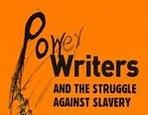
Be part of the Power Writers experience - an exhibition of five African
writers who had connections with the area in the 18th century. This will be
displayed during the month of May at the Archives. Listen to tributes
and contribute to an afternoon of fun, education and reflection. This event
is free, no booking required, browse the stalls and the displays. The first
fifty people arriving will be given a copy of the 2nd edition (2005) of the
Power
Writers book published by Hansib Publications.

There is no escaping
the pain of grief. Philip's friend
Sam Shakes has
explored the depths of emotions in her writing and her art. After Philip's
death she formed
a poetry group for bereaved people at St Joseph's hospital
in Hackney. Her painting
"Flaming Spirit" depicts the candle-light of life
burning in the well of grief and depression and refusing to be put out.
Philip excelled at the dramatic representation of
THACMHO's symbols of perseverance from past to present
(Tabono)
and health through history
(Sankofa).
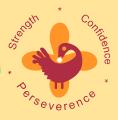
In 1999
Philip Morgan joined
Tower Hamlets African and Caribbean Mental Health Organisation
(THACMHO) and made a valuable contribution to its
development especially through the
Health through History initiative sub
committee, established in 2001. He wrote about
London's Black African History and Today in 2004.
Different kinda life to the one I used to know.
Since all the madness things have changed,
I really don't know if they will ever be the same,
Used to be active used to have fun.
Used to sit around and bun, bun, bun.
I don't smoke no more cause it intoxicate the brain something that
could quite literally send me insane,
Friends stick around glad that they care.
Don't know what I would do if they were not there.
On medication one tablet a night,
put on so much weight it cause quite a fright.
Deep in my thoughts have to keep strong
sometimes I wonder where it all went wrong,
Was it stress like the doctor said or was it a depressed state deep in
my head.
I guess some things you'll never ever know
It's just so funny how life can go.
Prada, stone island clothes I used to wear,
when I was on benefit they seem pretty dear
renegade eninem sending me crazy
why did I become so bloody lazy.
Was it the meds that got me in this state
or was it pure and simple that I put on this weight.
People say rocker pull yourself together
but sometimes I fill like I'm rougher than leather.
Going insane, insane is a crazy thing whole heap of problems it can
bring
Thank God for family thank God for friends
All the things that help you mend.
Stopping my mind from a Uri Geller bend.
Time on my hands to work out the end.
Birmingham University
By Kieran Bradley (2015)
You can take my word for that
I was told that I was mental
As in the loony bin I sat
I'm more batty than a bat
Due to the rising hate crime
Kindly keep that under your hat
We've always been treated bad
Nothing ever changes for the better
It's no wonder that we're mad
And that is no word of a lie
I'm a Friend of the East End Loonies
Will be one till the day I die
There is a welcome on the mat
I'm a Friend of the East End Loonies
Quis Separabit? and all that
Quis Separabit? means Who will separate us?
Emotional journeys - December 2011
International Survivor History - Solidarity in multicultural
diversity - June 2014
Family
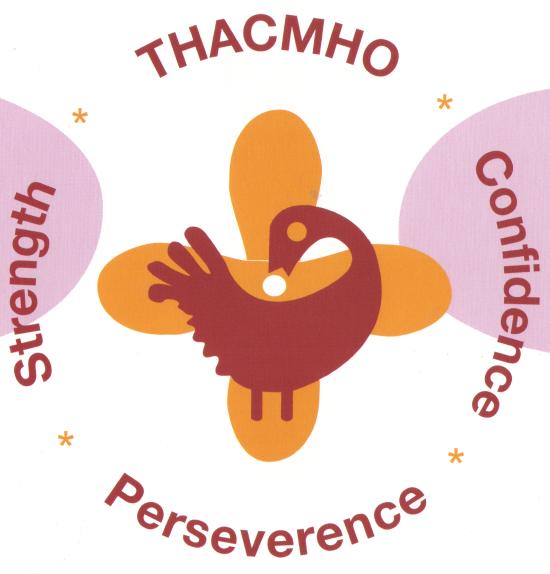

Philip Morgan was a member of the Survivors History Group, whose logo is a
fish swimming freely, the snake of knowledge, and the beating heart of the
world. For the Survivors History Group: visit
the website or contact
Andrew Roberts
